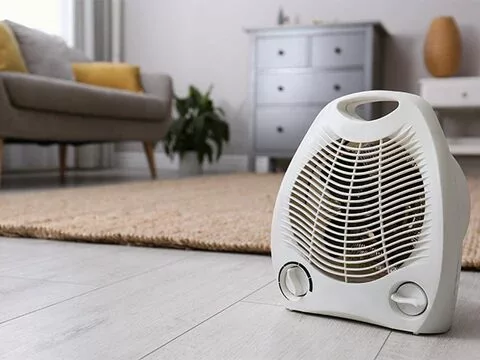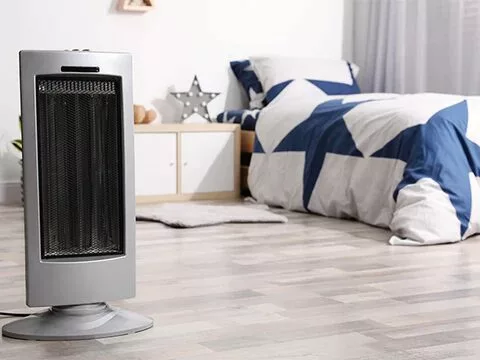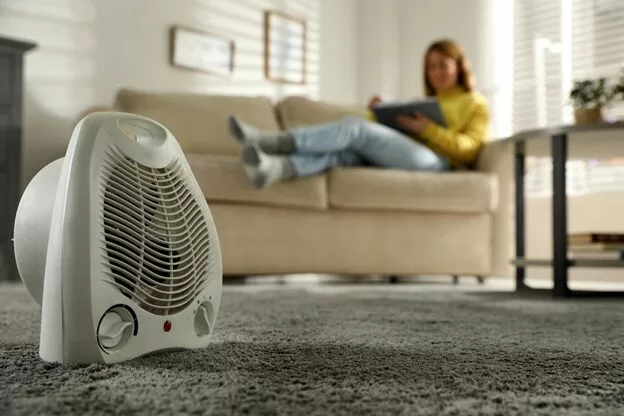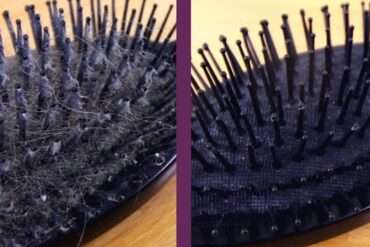Table of Contents
When you need extra warmth in any part of your house, space heaters are a simple solution. They may be used in most indoor spaces and are simple to use. All you need to know is how to operate a space heater correctly and what situations might be risky when doing so. We’re ready to put on the heat and address any of your urgent space heater-related enquiries.
Do Space Heaters Dry Out The Air?

Elevating the temperature in a room might result in dry skin and static electricity building up on soft objects like blankets. Is my space heater to blame for this, one may wonder? In technical terms, they don’t dehumidify interior rooms, thus the short answer is no. In other words, space heaters raise the temperature of the air, which raises the air’s capacity to absorb water and causes the air to seem drier.
To elaborate, only when a space heater is turned on does the air feel drier because the temperature drops and relative humidity drops. The amount of water vapour in the air in relation to the temperature is known as relative humidity. Since little to no water is introduced to a room that is warmer, the air feels drier because warm air can contain more water than cold air. Warmer temperatures cause your skin to retain more water, which can be absorbed by the air and leave you feeling dry on both your skin and the surrounding space.
Is it Safe to Run a Space Heater All Night Long?

It’s lovely and cosy to sleep in a warm room with lots of blankets, especially during the winter or on chilly days, but is it appropriate to use a space heater to heat your room while you sleep? Even with all of the advancements that space heater manufacturers continue to make, leaving one on all night is still not a smart idea. Even with an automated shutoff option, leaving a heater on while you sleep poses a risk and may cause harm to the heater and/or your house. You probably won’t notice until it’s too late if the heater starts to smoke, ignite, or overheat while you’re asleep.
It is considered safe to use a space heater while you are awake since you can detect problems right away. If the heater tips over, you may quickly put it right side up and take care of any sparking or smoking. Always bear in mind to never, ever leave a space heater unattended and to keep anything at least three feet away from the heater’s sides. Your space heater should never be powered by an extension cord; instead, it should always be plugged straight into the main outlet.
Can I Use a Space Heater on Carpeted Floors?

In general, using a space heater on carpeted flooring is not a smart idea. Make sure you are in the room at all times when the heater is running if you have no other choice. This is particularly true if you have kids or animals in your home who might not be aware of their surroundings and end up knocking the heater over or getting wounded after coming too close to it. Toxins that accumulate over time from the heater’s ventilation system can also be absorbed by carpets and rugs.
Why Do Space Heaters Smell Like Something is Burning?

Your space heater may smell burning for a few different reasons. While some are normal and won’t smell after a few applications, others are cause for immediate action.
If a space heater is fresh new, it may smell like it’s burning. The reason for this burning scent is that the heater may contain dust or debris from the packaging or manufacturing that has settled on it and is burning off as the temperature rises. It should start to smell less burnt after a few uses. The same holds true if dust accumulates on your heater after a season of non-use. You can use a dry towel to clean the heater before plugging it in and turning it on to help avoid the burning smell. On a warm day, you may also turn on the heater and leave the windows open to let fresh air assist burn off the dust and eliminate the odour.
Unplug your space heater right away if it smells like it’s burning and it’s connected to an extension cord. Before reactivating the heater, let it cool down. Rather than using an extension cord, place the heater straight into a wall outlet. Space heaters cannot be powered by extension cords because the energy needed to run a heater exceeds the capacity of an extension cord.
Something might be covering your space heater, which would explain why it smells like it’s burning. The heater may malfunction or overheat if an object comes into contact with it while it is on because this could affect the ventilation system. Provide a 3-foot operating zone for the heater to prevent anything from getting into touch with it. To avoid any mishap, keep all furniture and other objects out of this tiny heating bubble.
A space heater that smells like it’s burning could also be the result of overheating. In order to minimise overheating, the majority of heaters include automatic shutoff features. If yours doesn’t, there are a few things you may do. The heater should be turned off right away, unplugged, and allowed to cool fully. To further control the temperature, consider running the heater on an intermittent setting after it has cooled.
Can You Use a Space Heater to Kill Bed Bugs?

Nothing is worse than getting into bed for the night, pulling back the blankets, and discovering that there is a crawling creature nearby. When you throw back the sheets after leaping out of bed, you discover bed bugs! Horrible! How can you swiftly get rid of them? It turns out that eliminating bed bugs naturally with heat is among the best and simplest methods available. Does it mean you can get rid of the bugs in your bed with your handy-dandy space heater?
Regretfully, bed bugs cannot be eliminated by space heaters. Even on their maximum setting, space heaters are not hot enough or cover enough ground to eradicate a whole infestation. Using a space heater might help get rid of some issues, but not enough to solve the issue entirely. Heat applied continuously for 4-6 hours at 130–140 degrees Fahrenheit is necessary to guarantee the death of all bed bugs, regardless of their life stage. Using a bed bug heater is the greatest approach to eradicate bed bugs from your house because it eliminates the need for chemicals and ensures that every bug has been driven out.
On chilly days, space heaters can in handy for staying warm in your house. All you need to know is how to operate one correctly, what to do in case something goes wrong, and what applications are suitable for and inappropriate for space heaters. We hope that this helps clear up some of your doubts regarding the capabilities of a space heater. For interior heating alternatives to keep you toasty this winter, check out our assortment.





